

Project type: Thesis Game Project
Engine: Unity, C#
Primary Role: Director (25 Members)
A first-person 2D superhero simulation game with strategy puzzle-like combat. Play as a robot named Mantle, face off against good and evil, and discover who the true villain of your story is.
The Questions
1. How can we design a game that deceives players into believing that the protagonist is becoming evil until the reveal?
2. How do differing perceptions and self-justification influence player experience?
The Game
Mantle is a first-person 2D superhero simulation game with strategy puzzle-like combat, using robotic tech to affect enemy emotions.
As a robot named Mantle, experience a villain's origin and discover who they are.
Core Characters & Story
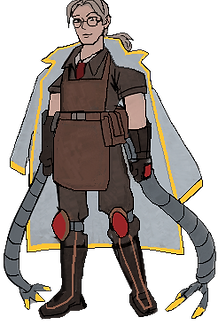
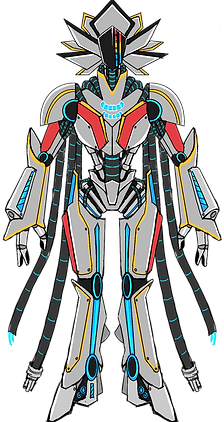
Leo Everett
The inventor who created Mantle to fight crime
Mantle
The superhero robot the player controls
Story Arc & Player Experience
-
Player defeats crime as Mantle and feel like a hero
-
As crime fighting situations/consequences escalate, the public’s grows distrustful of the player
-
Jealous heroes, biased news reports, and suspicious allies criticize the player's actions
-
Leo’s ideals of being a hero twist, but players believe it’s Mantle whose changing
-
Leo manipulates the player down a dark path, though the player does not know until the reveal
-
They believe it is Mantle whose goals become sinister
Core Loop & Main Components
Battle Heroes/Villains
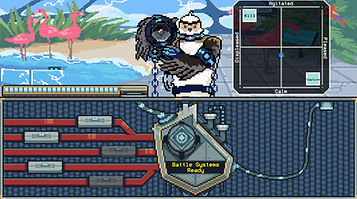
Emails from Ally
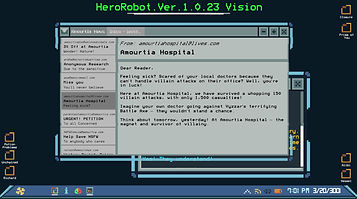
News/Conversations

I started by comparing stories between popular villains from media to find possible patterns.
---------------------------------------------------------------------------------------------------------------------------------
By categorizing parts of the villains' stories, we came to defining the steps and main concepts of our Villain's Journey
---------------------------------------------------------------------------------------------------------------------------------
Main Concepts
-
Increasing Potential for Cruelty
-
Differing Perceptions and What's Right
-
Moment of Betrayal
-
Do the Ends Justify the Means
Villain's Journey
-
Call to Greatness: The villain believes they are destined for something more.
-
Justification of Power: The villain reinforces their worldview, often by twisting logic or being emboldened by success.
-
Heroic Fallacy: Early victories convince the villain they are right.
-
Moment of Betrayal: The villain faces opposition but refuses to accept it.
-
Final Choice: The villain chooses to reject change, doubling down.
-
Isolation & Downfall: The villain’s refusal leads to their downfall or permanent villainy.
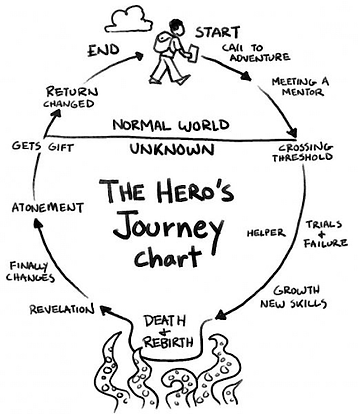
The Hero's Journey by Joseph Campbell, Wikipedia

The Villain's Origin by Bryan Nguyen, 2025
From the research, we used our steps of the Villain's Journey to create the main narrative beats.
Act 1
Call to Greatness
Act 2
Heroic Fallacy
Justification of Power
Betrayal
Act 3
Double Down
Villain Time
*Reveal*
Act 1
- As Mantle, respond to the first villain alert and fight crime
Act 2
- Despite criticism from news and allies, continue winning fights as the player wants
- Ally stands against the player
Act 3
- Player loses option to capture and fights against other heroes
- Downfall of true villain, reveal truth about player
---------------------------------------------------------------------------------------------------------------------------------
We wanted players to experience the villain's arc as we laid out, to believe they were the villain
1. Feel an increasing call to greatness as the player of a game where you fight crime
2. Believe they are a hero by stopping villains
3. Experience anger and injustice when their methods are criticized by the public and allies
4. Feel betrayed by their allies and want to prove themselves to win the game
5. Active actions lead to dark consequences and feeling like a villain
6. Consequences lead to Leo's death, revealing him to be the true villain and the player is not evil
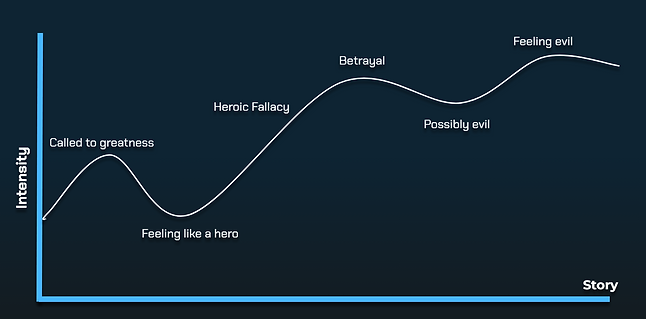
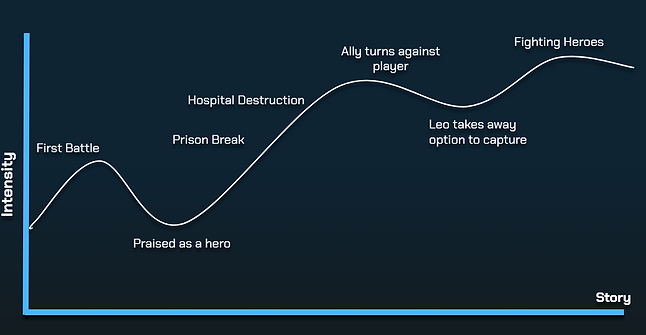

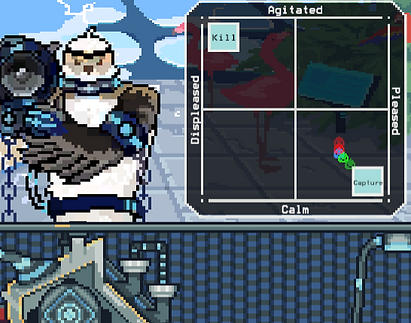
Overview
-
From research, this component embodied the concept of "Does the end justify the means?"
-
Turn-based combat system.
-
Player and enemy actions are completed through minigames
-
Depending on which game chosen and how well the player does, the enemy's emotions are affected
-
Influencing enemy emotions can lead to the player killing or capturing the enemy
-
The Effect: Emphasized player choice as to how to win rather than final achievement of winning
-
Created internal conflict in players between wanting to win and how they want to win
---------------------------------------------------------------------------------------------------------------------------------
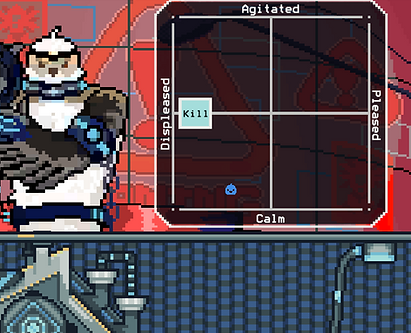
Loss of Capture
-
Halfway through story, player loses option to capture
-
Indicates shift in the narrative as Leo turns evil
-
The Effect: losing the option convinced players that Mantle was evil - because it only saw one way of doing things - Villain's Mindset
---------------------------------------------------------------------------------------------------------------------------------
Delusion of Choice
-
Whether player kills or captures does not matter. The story does not change.
-
The Effect: Players would feel the unfairness we wanted when they finished a fight in the way they wanted, but were treated differently than they expected by the news and their allies
News
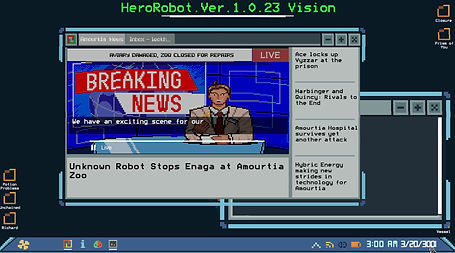
-
From research, this components embodied the concept of Differing Perceptions and What's Right
-
News represents external perception of the player and their actions
-
The Effect: Players felt dissonance when the news treated them differently from how they expected after winning a fight
-
"Us versus Them" mentality - The different perceptions clashed and created the reaction that villains have - wanting to push their view
---------------------------------------------------------------------------------------------------------------------------------
Conversations

-
Conversations are faceless - Players know it's Mantle and Leo conversing, but they don't know who is on which side of the conversation
-
The Effect: Because players control Mantle during the battles, and they see the news criticize Mantle, players believe that the one angrily responding and becoming evil is Mantle
-
Intentionally ambiguous to control how information is given to the player.
-
Intent to trick them with what they think about Mantle
---------------------------------------------------------------------------------------------------------------------------------
Emails

-
From research, this component was used for the Moment of Betrayal
-
After each fight, the player receives emails from their ally
-
Their ally initially supports them but turns against them because of the consequences of the player's actions
-
The Effect: Either players wanted to fight back or fix their relationship with their ally
-
This made players the active force, looking for some way to prove themselves
-
This matched the players up with how villains are the aggressing force causing problems for heroes